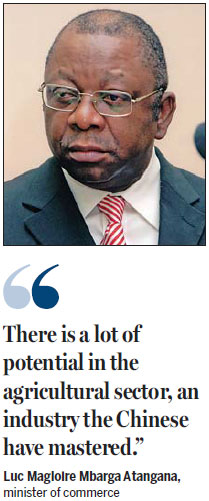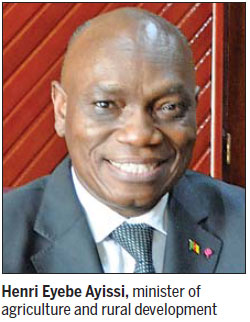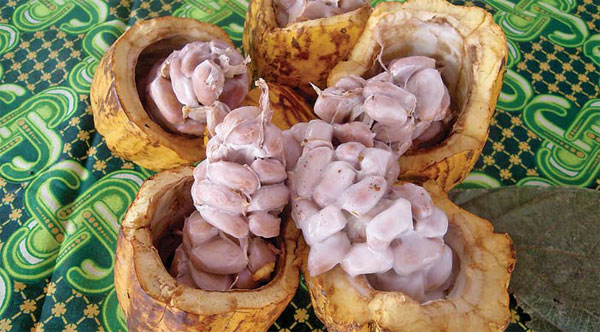Nation's resources ripe for investors
|
Traded at prices that hit all-time highs, cocoa is a key strategic commodity for the Cameroonian economy. Photos provided to China Daily |
From oil and gas to cash crops, Cameroon is reaping rewards of its assets
With an enviable location on the West African coast at the heart of a market of more than 1.2 billon consumers, Cameroon is regarded as the "Gateway to Central Africa".
The country, a founding member of the Central African Economic and Monetary Community, is part of the Economic Community of Central African States. The nation also benefits from duty and quota-free access to the vast European Union market.
Trade relations between China and Cameroon have grown steadily in recent years and reached $2.57 billion in 2014, up 36 percent from the previous year. Imports from China grew by an annual rate of 32 percent from 2010 to 2014 and grew in value by 22 percent over the same period.
Most of these products imported by Cameroon were equipment, machinery, electronic devices and cars. Exports to China mainly consisted of wood, coal, cotton, hydrocarbons, oil, aluminum, iron and rubber.
"The most important improvement in the trade sector has been the diversification of our commercial partnerships," said Minister of Commerce Luc Magloire Mbarga Atangana. "In line with Vision 2035, the trade sector will grow in three directions: consolidating existing commercial partnerships, establishing new ones with emerging countries and strengthening cooperation on a regional level.
"In 2014, we ratified our economic agreement with the EU. We have also continued our policy of economic cooperation with the United States. The EU, the US and China are our most important trade partners.

"The trade sector is highly dynamic and the challenge is to supply those markets with our products - hence why we need international investors as partners to help us consolidate our positions. We are a competitive destination. Investors who decide to produce in Cameroon will be able to export their Cameroon-labeled products to lots of countries."
Substantial offshore and onshore oil and gas reserves have long made Cameroon a powerful magnet for FDI in the upstream and downstream sectors and this capital expenditure enabled production to increase by about one-fifth year-on-year in 2015 to more than 100,000 barrels a day.
Red light to petrol hikes
Although crude oil prices fell sharply in late 2015 and into this year, the industry continues to perform well and is a key source of foreign exchange earnings for the government and provides jobs to thousands of local and foreign workers.
CSPH - a public institution with legal entity and financial autonomy operating under the supervision of the Ministry of Trade - participates in all operations aimed at maintaining the domestic energy policy by contributing to the exploration, production, refining, storage and distribution of hydrocarbons in the upstream and downstream sectors.
"We ensure prices are stable and regulated. Volatility is a pervasive reality and specificity of our sector. Prices move every day. In the US, or in other more sophisticated markets, prices at the petrol pumps change every day. In young economies, you cannot check and adapt on a daily basis as is done in more sophisticated markets," said Elung Paul Che, general manager of CSPH.
"An economy with all the prices across all sectors changing every day would not be efficient or realistic. The currency has to be stable; the prices of all your tradable goods and services have to be stabilized on a daily basis.
"With regulation, the economy is stabilized and private investors have some sense of predictability. No investor would enter an unstable environment.
"Our price stabilization mechanism consists in that we put in place a system with a price structure that virtually captures the prices from the upstream sector on a monthly basis and smoothes it over a longer period of time. If the price goes up, this rise is reflected over a longer period of time (rather than immediately)."
Last year, energy officials announced the construction of a pipeline from Limbe to Yaounde via Douala and Edea in a well-received move that will boost the supply of hydrocarbons in several major cities. The lengthy structure will provide a faster and cheaper alternative to the transportation of hydrocarbons by road and water, thus reducing energy costs for end users such as motorists.
Che expects Chinese enterprises to continue to play a role in the energy industry and gain a stronger foothold in other areas. "Cameroon has a lot of potential across all sectors," he said. "With the opportunities and the investments already seen in the energy sector, our country will be not only self-sufficient but also become an exporter of electricity. In the oil and gas sector, with the plans to increase production, there are also plenty of business opportunities."
TRADEX, a private company established in 1999, specializes in the distribution of petroleum products and boasts operations in Cameroon as well as Chad, Equatorial Guinea and the Republic of Central Africa. In the short term, the firm plans to expand its product range and spectrum of services in a move that will see the signing of new partnerships with Chinese companies.
"At TRADEX we have proved our ability to react to the needs of its customers and to provide high-quality products," said General Manager Perrial Jean Nyodog. "As a result, our clients have established long-term partnerships with us. Chinese companies have to know that TRADEX is a first-class partner for them.

"Our goal is to become the leader in the supply of petroleum products, not just in the region but also in Africa. We are willing to expand our activities outside Central Africa. We want to strengthen our local network, develop the one we have in Chad, increase our range of services and contribute to the innovation within the sector."
Adding value is target
Meanwhile, Minister Mbarga Atangana revealed the government has identified and prioritized a number of infrastructure projects, including roads, ports and airports. "We also need to invest in production and to learn to add value to products by transforming them here. There is a lot of potential in the agricultural sector, an industry the Chinese have mastered. We have 450,000 square kilometers of arable land."
Reinforcing the agricultural sector's importance for food security, sustainable and environmentally friendly development, source of employment and foreign earnings is the Ministry of Agriculture and Rural Development. The department is working to secure billions of dollars of funding as part of a pancontinental, agricultural development program. Cameroon has also partnered with the World Bank for a project to support the transformation of low productivity, subsistence-oriented cassava, maize and sorghum subsectors into commercially oriented and competitive value chains in four agro-ecological areas.
Impressive progress has already been made as partnership agreements have been signed with farmers' cooperatives, commercial banks, agro-industries and research institutes, among others.
"As an existing partner, China can support us in all the aspects of this new policy," said Henri Eyebe Ayissi, minister of Agriculture and Rural Development. "We need to create the conditions for partners to come and work with us. The new strategy aims to create jobs and train young professionals who will be the future of our agriculture."
InFocus provided this story
(China Daily 04/11/2016 page6)



















